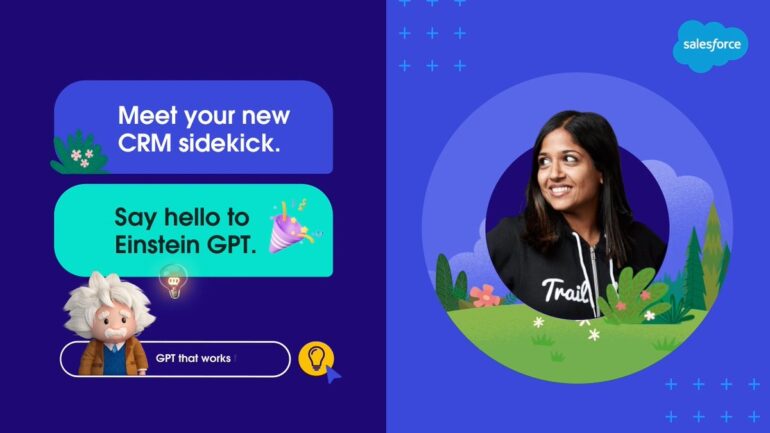TL;DR:
- Generative AI brings productivity improvements but poses risks.
- Salesforce introduces the Einstein GPT Trust Layer to address trust and protection concerns.
- The trust layer ensures data security, context accuracy, toxicity detection, data privacy, zero retention, and auditing.
- Salesforce sets an example for other solution providers in leveraging AI benefits while minimizing pitfalls.
- Prioritizing trust and ethical considerations in Generative AI is crucial for businesses.
Main AI News:
Generative AI has emerged as a game-changer, revolutionizing various aspects of business operations and productivity. In this pursuit, Salesforce has taken a proactive approach, incorporating Generative AI into its comprehensive suite of CRM and business productivity solutions. However, it is important to acknowledge that Generative AI is still in its infancy and brings along certain risks. Salesforce, in a recent blog post, aptly acknowledges the concerns surrounding this technology, highlighting the “trust gap” caused by potential hallucinations, toxicity, privacy breaches, biases, and data governance issues.
Addressing these challenges head-on, Salesforce has introduced the Einstein GPT Trust Layer—an invaluable addition to their offerings, aimed at mitigating the risks associated with Generative AI. This trust layer serves as a safeguard, ensuring that Generative AI behaves responsibly while safeguarding data privacy and security. By seamlessly integrating this layer into their development platform, which empowers developers to create functionalities using LLM models, Salesforce aims to bridge the trust gap that often hinders the widespread adoption of Generative AI.
The Einstein GPT Trust Layer encompasses several key services, each designed to fulfill a specific purpose:
1. Secure data retrieval: This service focuses on fortifying the security of data utilized by Generative AI models. Robust security measures, including encryption and access controls, are implemented to safeguard sensitive information from unauthorized access and potential breaches.
2. Dynamic grounding: To align the output generated by Generative AI models with the intended context and purpose, dynamic grounding plays a crucial role. This service ensures the accuracy and relevance of AI-generated responses, minimizing the risk of generating irrelevant or misleading information.
3. Toxicity detection: Addressing concerns related to the generation of harmful or inappropriate content, the trust layer incorporates a toxicity detection mechanism. By analyzing the generated content for offensive or harmful language, this service helps prevent the inadvertent production of toxic outputs.
4. Data masking: Data privacy is paramount, and data masking serves as a critical component in achieving it. The trust layer employs techniques to obfuscate personally identifiable information (PII) or any other sensitive data present in the prompts or messages returned by Generative AI models. Compliance with privacy regulations is thus ensured, and user information is safeguarded.
5. Zero retention: Upholding user privacy as a top priority, the trust layer adopts a zero retention policy. This means that prompts sent to Generative AI models are neither stored nor retained, significantly reducing the potential for unauthorized access or data leakage.
6. Auditing: Transparency and accountability are vital when it comes to Generative AI usage. The auditing service logs and monitors the activities associated with Generative AI, allowing organizations to track and review interactions between users and AI models. This facilitates compliance with regulatory requirements and aids in identifying potential issues or biases.
Salesforce deserves commendation for proactively integrating services that enhance the reliability, trustworthiness, and ethical usage of Generative AI solutions. It is important to note that Salesforce is not alone in these efforts; other solution providers must also meet these benchmarks when assisting customer care organizations in evaluating and experimenting with potential use cases for Generative AI. Notably, call summarization, intent modeling, and sentiment analysis are among the instances with immediate business impact. The Einstein GPT Trust Layer serves as a model for other solution providers, guiding them in harnessing the benefits of AI while minimizing potential pitfalls.
Conclusion:
The introduction of Salesforce’s Einstein GPT Trust Layer signifies a significant step towards building trust and enhancing reliability in the domain of Generative AI. By addressing concerns related to security, context accuracy, toxicity, data privacy, and auditing, Salesforce sets a benchmark for other solution providers. This development emphasizes the importance of prioritizing trust, ethics, and responsible AI usage, which will ultimately shape the market’s trajectory. Businesses must embrace these measures to harness the full potential of Generative AI while ensuring data privacy, security, and ethical practices in their operations.

